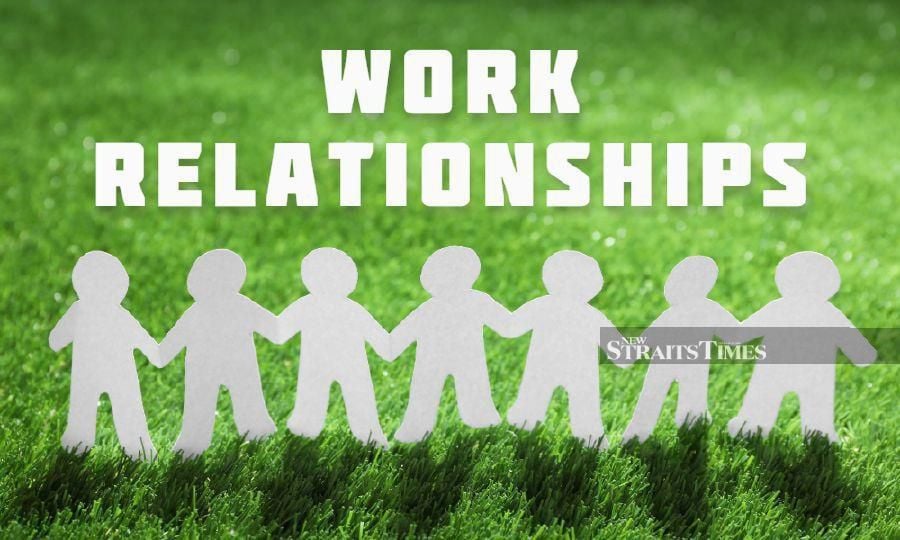At our workplaces, aside from the occasional narcissistic boss, the biggest challenge we have is to form solid, and functional relationships with colleagues, line leaders and decision makers.
The relationships I speak of are not the run of the mill lunch partnerships or sporadic beverage buddies. I also don't mean the obsequious and cloying referring to each other as kakak or bro.
Many connections at the workplace are tricky and fraught with difficulties. We will always have colleagues who are being uncooperative. Their relationship with you will impact your effectiveness and the smooth operations of your company.
In my leadership coaching programme, I remind participants regularly to manage and repair their functional relationships with others. Everyone has vital relationships that sometimes end up becoming dysfunctional. And, if you find yourself in this situation, it is critical that you work at fixing it right away.
The effectiveness of your functional connection with any colleague at work requires both of you to fulfil agreed and fixed obligations to each other. It is only when you have this clarity and agreement that you can deliver results at work.
I had asked one of my coachees to understand the types of relationships she had at work. We chatted about this, and she felt better equipped to deal with her dilemma.
What are the relationships that you find at your workplace?
Sometimes, they are just purely transactional. This is when you cooperate as a means to an end. If you are cooperative in these transactional interfaces, you will both walk away feeling good. These are the simplest connections at work.
Then, there are relational connections. These relationships are meaningful engagements that you have to build and maintain over an extended period of time. If you have relational connections with your colleagues, you will not only care about the outcomes but also about your colleague.
This is the more important type of workplace relationship.
To manage these relationships properly, you must pay attention to the process and quality of how you are both communicating. It is not just about interacting as a means to an end. You have to watch your emotions and what you say.
What do you need to be vigilant about at your workplace when attempting to build these relationships?
Aside from your emotions, the biggest threat to relationship- building is toxic people. Colleagues who are toxic always have a destructive attitude and will create a damaging work atmosphere.
You must construct strong relationships that will help you withstand the onslaught of the occasional nastiness that occurs in all companies. Tighten up your connections with those coworkers you have functional relationships with, so that you withstand this toxicity.
Remember that when your relationships are purposeful, you can work better together.
For example, if you are barely on speaking terms with someone, and you are put together in a project, it will take time to understand each other before you can work collaboratively.
On the other hand, if you know someone and respect them, it becomes easier to work together.
Everyone spends a lot of time with their colleagues at work. If you enjoy your time with them, naturally, you will produce better results rather than if you do not look forward to it. Work needs to be fun for you to have better morale. Stiff and unfriendly workplaces can't provide fun.
In my experience, employees feel connected with their jobs only when they have strong connections with each other and share the organisational vision.
For leaders, it is vital to recognise that connected relationships offer higher retention rates, which are necessary for sustainable growth.
And, from a profitability standpoint, happy employees are always more productive. A well-adjusted workforce is a productive one. This is what you need.
When you develop strong links with your colleagues, you can create collaborative relationships with each other. This gets everyone connected to their functions and roles, and in turn, collectively, you all produce phenomenal outcomes for your organisation.
It all begins with solid relationships.
The highest value task for the business owner, chief executive, or line leader is to create conducive workplaces that foster the building of these relationships.
You do this by jointly developing a strong mission that everyone agrees on. This means you do not deliver the mission, top-down, from the board of directors. Instead, you get everyone in your team to contribute to creating it. This is the start of any buoyant team-based environment.
After this, work on tightening your workplace relationships by setting clear expectations, and practising constant communication. This means regular discussions and feedback, and establishing practices on resolving conflict quickly when it occurs.
In our quest to make our career flourish and withstand the test of time, we sometimes focus on the road ahead too much. As much as we need to give time for growth and new ideas, we must also devote time to build relationships with the people we work with.
The views expressed in this article are the author's own and do not necessarily reflect those of the New Straits Times






